Andrew Furst's Blog, page 145
February 17, 2015
Compass Songs – Rabindranath Tagore – Stream Of Life
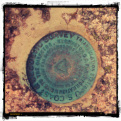 Compass Songs is an ongoing series of works by poets that I enjoy. Poetry, as the Zen Masters have said, is like a finger pointing to the moon. It speaks the unspeakable.
Compass Songs is an ongoing series of works by poets that I enjoy. Poetry, as the Zen Masters have said, is like a finger pointing to the moon. It speaks the unspeakable.
The same stream of life that runs through my veins night and day
runs through the world and dances in rhythmic measures.
It is the same life that shoots in joy through the dust of the earth
in numberless blades of grass
and breaks into tumultuous waves of leaves and flowers.
It is the same life that is rocked in the ocean-cradle of birth
and of death, in ebb and in flow.
I feel my limbs are made glorious by the touch of this world of life.
And my pride is from the life-throb of ages dancing in my blood this moment.
First Name:
Last Name:
Email address:
Select a Weekly Series You'd Like to Follow:
One Minute Meditations
Tiny Drops (Photography series)
Compass Songs (My Favorite Poems)
Dialectic Two-Step
Modern Koans (interesting questions)
Sunday Morning Coming Down (Music Videos)
Relics (Timeless Republished Articles)
The post Compass Songs – Rabindranath Tagore – Stream Of Life appeared on Andrew Furst.
February 16, 2015
Dialectic Two-Step – How Can Technology Minimize Suffering?
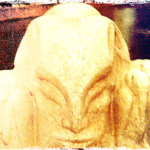 Dialectic Two-Step is an ongoing series of my thoughts on questions that come my way.
Dialectic Two-Step is an ongoing series of my thoughts on questions that come my way.
Wisdom lies neither in fixity nor in change, but in the dialectic between the two. - Octavio Paz
How Can Technology Minimize Suffering?Question: How can the advancement of technology be used to minimize suffering around the world?
Response: I think there are two key ways in which advancing technology has always been able to minimize suffering.
1. Improve quality of life through advancements in science and the arts. We can reduce the impact of disease, increase safety, and promote a better educated society.
2. Spread the message that suffering can also be minimized by waking up to the world.
We continue to make steady progress on the first point. On the latter, we may be failing.
Minimize Ego, Minimize SufferingBeyond disease, old age and death, much of our anguish is self-perpetuated. We are dissatisfied because the world doesn’t meet up with our expectations. When we recognize that any leverage we feel we have on the world is inconsequential, we can let go of our preferences, aversions, and disappointment. This opens a space within to appreciate the beauty, wonder, and mystery of the world as it is.
Ironically this message is often lost on the more technologically advanced nations. We might take a lesson from our more modest neighbors on this important point.
Get Each Week's Dialectic Two Step in your email boxFirst Name:
Last Name:
Email address:
Select a Weekly Series You'd Like to Follow:
One Minute Meditations
Tiny Drops (Photography series)
Compass Songs (My Favorite Poems)
Dialectic Two-Step
Modern Koans (interesting questions)
Sunday Morning Coming Down (Music Videos)
Relics (Timeless Republished Articles)
The post Dialectic Two-Step – How Can Technology Minimize Suffering? appeared on Andrew Furst.
February 15, 2015
One Minute Meditation – Coronado Sunrise
 One Minute Meditations is an ongoing series of short videos, poems, and commentary intended as a meditation. Offered as an opportunity to step back from your cyber routine and settle into a more natural rhythm, if only for a minute.
One Minute Meditations is an ongoing series of short videos, poems, and commentary intended as a meditation. Offered as an opportunity to step back from your cyber routine and settle into a more natural rhythm, if only for a minute.
I went to a conference in San Diego a few years back and had the great fortune to stay at one of the worlds most beautiful resort hotels, the Hotel Del Coronado. Among the many perks of staying at this hotel was an ocean facing hotel room. I fell asleep and woke to the sound of the surf. Also being on east coast time, I was up very early and got to enjoy walks on the beach in the morning. I’ll share this one with you today.
Coronado SunriseThe sun crowns the day
The Queen dances and the King
rejoices again
First Name:
Last Name:
Email address:
Select a Weekly Series You'd Like to Follow:
One Minute Meditations
Tiny Drops (Photography series)
Compass Songs (My Favorite Poems)
Dialectic Two-Step
Modern Koans (interesting questions)
Sunday Morning Coming Down (Music Videos)
Relics (Timeless Republished Articles)
If You Watched The One Minute Meditation, How Do You Feel? Note: There is a poll embedded within this post, please visit the site to participate in this post's poll.
The post One Minute Meditation – Coronado Sunrise appeared on Andrew Furst.
Sunday Morning Coming Down – Orange Sky
 Sunday Morning Coming Down is an ongoing music video series. The songs fit my definition of music for a lazy couch bound Sunday morning.
Sunday Morning Coming Down is an ongoing music video series. The songs fit my definition of music for a lazy couch bound Sunday morning.
First Name:
Last Name:
Email address:
Select a Weekly Series You'd Like to Follow:
One Minute Meditations
Tiny Drops (Photography series)
Compass Songs (My Favorite Poems)
Dialectic Two-Step
Modern Koans (interesting questions)
Sunday Morning Coming Down (Music Videos)
Relics (Timeless Republished Articles)
Orange Sky
Well I had a dream
I stood beneath an orange sky
Yes I had a dream
I stood beneath an orange sky
With my brother standing by
With my brother standing by
I said, Brother, you know you know
It’s a long road we’ve been walking on
Brother, you know it is you know it is
Such a long road we’ve been walking on.
And I had a dream
I stood beneath an orange sky
With my sister standing by
With my sister standing by
I said, Sister, here is what I know now
Here is what I know now
Goes like this..
In your love, my salvation lies
In your love, my salvation lies
In your love, my salvation lies
In your love, in your love, in your love.
But sister you know I’m so weary
And you know, sister
My heart’s been broken
Sometimes, sometimes
My mind is too strong to carry on
Too strong to carry on
When I am alone
When I’ve thrown off the weight of this crazy stone
When I’ve lost all care for the things I own
That’s when I miss you, that’s when I miss you, that’s when I miss you
You who are my home
You who are my home
And here is what I know now
Here is what I know now
Goes like this..
In your love, my salvation lies
In your love, my salvation lies
In your love, my salvation lies
In your love, my salvation lies
In your love, my salvation lies
In your love, my salvation lies
In your love, my salvation lies
In your love, in your love, in your love
Well I had a dream
I stood beneath an orange sky
Yes I had a dream
I stood beneath an orange sky
With my brother and my sister standing by
With my brother and my sister standing by
With my brother and my sister standing by
The post Sunday Morning Coming Down – Orange Sky appeared on Andrew Furst.
February 14, 2015
Bridges – A Two Dimensional Poem
What’s a two dimensional poem? I’m not sure either. I dreamed this up last night. Can’t say whether it’s my creation or something someone smarter and more creative than me already offered the world. In any case Bridges is my version of a 2D poem.
The first dimension is the poem in its traditional form. A linear form from left to right and top to bottom. The second is a non-linear word by word selection in time and space that creates a separate poem from within the first. For now I’ve decided the easiest way to digest this is via video.
Bridges The 49th Street Galleria by Chris Zabriskie is licensed under a Attribution License. Permissions beyond the scope of this license may be available at http://chriszabriskie.com/
The 49th Street Galleria by Chris Zabriskie is licensed under a Attribution License. Permissions beyond the scope of this license may be available at http://chriszabriskie.com/
The post Bridges – A Two Dimensional Poem appeared on Andrew Furst.
Relics – We Are and We Are Not Perfect
 The Relics series are throwback articles from previous years. They seem timeless enough to be relevant today.
The Relics series are throwback articles from previous years. They seem timeless enough to be relevant today.Try as you will, you cannot annihilate that eternal relic of the human heart, love. – Victor Hugo We Are and We Are Not Perfect
(Note: I did do a major overhaul on this piece, so if you read it last year, give it a once over)
This is the second in a series of concept diagrams I’ve fiddled with to work through some traditionally complex Buddhist ideas. The diagram plays with the notion of the Great Perfection or Two in One as my teacher explained it to me.
It’s a paradox of sorts. At the base of it is the existential riddle of Who am I? I chose a visualization to avoid the confusion that comes with holding two contrary ideas in your mind at the same time.
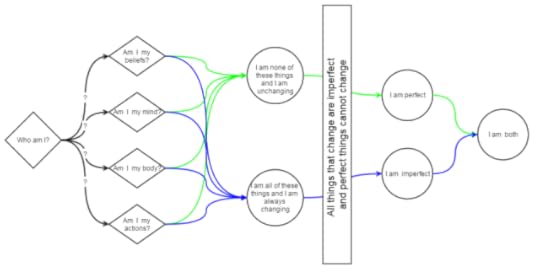
click to enlarge
Two In OneWho am I? What is the self? This is where we have to be honest. We have to be scientific. We can only go as far as the data allows us to. No more, no less.
How do we answer existential questions? Humans have been stumbling on them for millennia. So don’t get down if you’re confused. Most of the time, I’m confused. Let’s try to get at the self by asking a few questions about it and exploring the possible answers.
Am I My Beliefs?When we think about others, we see them as a constellation of qualities. Beliefs are an important one. We see some friends as religious, others not so much. Many have political convictions. Some friends like old Star Trek, others like Next Generation, and others just don’t care. We choose our companions in part based on their beliefs.
So when we think about self, we do think in terms of beliefs. But we also have to concede, we are not solely our beliefs. There is certainly more to us than that.
Am I My Mind?There is a lot to the notion that everything is mind. Eastern and western philosophical traditions have both converged on the understanding that we see the world through the filter of our mind. Language, symbols, and logic are the ways that the mind creates a working map of the real world. We operate primarily in this domain, rarely getting out of our heads to come in contact with “reality”
But despite the important role the mind plays in who we are, we are not mind alone. For example….
Am I My Body?The body includes the brain. The brain functions as the substrate for the mind. Wouldn’t it make sense then to assume that we are our bodies?
But wait, a few challenging questions show us that isn’t true either. If we were to lose a finger or a toe, are we no longer me. All the cells in the body are entirely replaced every 2500 or so days. Do we become a different person?
Proximately we are our bodies, but ultimately we are not.
Am I My Actions?Aristotle is quoted as saying, “We are what we repeatedly do.” This is true in many ways. We are judged by our behavior; accepted or rejected by the quality of our actions.
But again there is ambiguity. Our actions are important, but to propose that there is nothing else ignores our inner dialogue and intentions. Our actions do not fully encapsulate who we ultimately are.
Definitely Sort OfThe answers to these questions are yes,.. and no. Is that a problem? Let’s think about it.
In science, often time the key to a new discovery lies in framing the question right. If we have questions that have ambiguous answers, then perhaps we haven’t formulated the hypothesis well.
Imagine the birth of ornothology (the study of birds). An early bird watcher proposes classifying birds by their color patterns. He proposes that all birds can be divided into two classes; solid color birds and speckled birds. A robin would be a solid color class of bird and a European starling would a speckled class bird. It appears we can continue on with our classification for all birds. But alas, along comes a long billed thrasher. In this case, the bird is both solid colored and speckled. Is this impossible? No, it’s just the way it is.
Do I go into existential angst because I no longer know what birds are? I hope not.
The same applies to the self. In a relative sense, we are all this or that. We’re Democrats, blondes, engineers, and Buddhists. But these things don’t describe us fully in the absolute sense. This is the paradox of the Great Perfection.
So there appears to be two ways to look at who we are. First we can see ourselves as an aggregation of a great number of qualities. We can see ourselves as aggregates of our beliefs, experiences, physical attributes, and actions. We also have to acknowledge that these aggregations are always changing.
But we also know that all of these things seem to fall short of answering the question of who we really are. Here’s a place where it gets sketchy. Even Buddhists will disagree on this, because it lies at the crux of the chief philosophical problem that humans have been struggling with for millennia. That is, if I’m not just the sum of all of my parts, then what completes the puzzle?
I’m going to place the problem on a continuum. This helps me avoid what are described as extremes in Buddhism. The aggregates I spoke of earlier (body, mind, actions, etc) lie on the left hand side of this continuum. These things are relative, temporary, and always changing. On the opposite end of this spectrum lies the absolute, permanent, unchanging, and thus perfect. I equate perfect with unchanging for the following reason. If something changed, then, of course, it would either get better or worse. Therefore, if something changes, it cannot be perfect. The inverse would also be true. If something is perfect it cannot change. The best example of something that fits this description is the Abrahamic God.

click to enlarge
So If we take the question of who we are on this continuum, where would we lie? We are not the sum of our parts and we certainly don’t act like we’re all knowing, all powerful, perfectly good gods. So what gives?
Perhaps both things are true in that we lie somewhere in the middle.
So when we look to understand self, we might see ourselves as a little bit of both. A little bit county and a little bit rock ‘n’ roll. We are simultaneously ever changing imperfect beings and perfect unchanging beings. We are frail, troubled and broken individuals. But, we are also the universe looking back on itself, perfect in its completeness. We are two in one.
Get Each Week's Relics article in your email boxFirst Name:
Last Name:
Email address:
Select a Weekly Series You'd Like to Follow:
One Minute Meditations
Tiny Drops (Photography series)
Compass Songs (My Favorite Poems)
Dialectic Two-Step
Modern Koans (interesting questions)
Sunday Morning Coming Down (Music Videos)
Relics (Timeless Republished Articles)
The post Relics – We Are and We Are Not Perfect appeared on Andrew Furst.
February 13, 2015
Modern Koans – What About Syria?
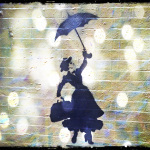 Modern Koans is an ongoing series that recognizes that good questions are often more important then their answers.
Modern Koans is an ongoing series that recognizes that good questions are often more important then their answers.The riddles of God are more satisfying than the solutions of man. ― G.K. Chesterton
What About Syria?This is a re-post of an article I published in the beginning of the Syrian civil war. I thought it was worth a revisit to see how things have evolved?
Whether it happens in the matter of a year, or over the course of an entire lifetime, everything falls apart. I saw this image of the tragic transformation in Homs Syria on Twitter and it said in pictures something that is a crucial life lesson for all of us. Nina Killham responded best.
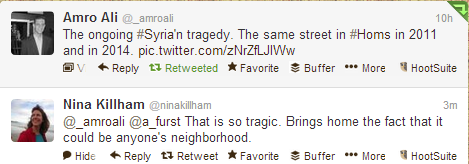
The illusion of time makes it appear as though this isn’t happening in our own neighborhood. But the truth is, it is happening everywhere, one life at a time, to people in our families and our neighborhoods . We can be blind to the fragility of it all.
It is commonplace to be disinterested in the plight of others, even those who suffer deeply. What is the cause of this. Are we desensitized? Are we powerless? Are we overwhelmed? With what?
We all bear burdens. Sometimes they’re heavy and difficult. These things absorb the energy it might require to take on the worlds problems. We certainly cannot help others until we help ourselves. To do so, we must seek out and take the medicine. We must set our sites on what is most urgent, the source of our personal suffering. If we can conquer this, perhaps we can muster the energy to help others.
The Buddha points to our mindlessness as the cause of suffering. We senselessly repeat the activities that produce dissatisfaction and expect it to somehow get better. The practice of mindfulness is a way to extract ourselves from the cycle of ignorance we drift in. If we’re successful, we would notice that our neighborhood is decaying. Maybe at a slower pace than in Syria, but none the less.
How Does Mindlessness Cause Suffering?Our mindlessness bears the mark of our personal delusions.
One of my delusions has been politics. As a liberal leaning person, I’ve viewed the suffering of the world through the lens of an anti-conservative agenda. In my lifetime I saw war and oppressive foreign policy as the domain of the Republican Party. Had I been born 10 or 20 years earlier, I would have discovered the roots of hawkishness in the administrations of FDR, Truman and Kennedy. Imagine my surprise as drone warfare and the violation of our civil rights by the NSA have proliferated under the Obama administration. Delusions are easily shattered when we subject them to scrutiny.
The power of political delusion has shaped the American dialog around the tragedy in Syria. It’s been framed as a partisan struggle for reelection. Republicans and democrats second guessing every move of the other. Both parties simultaneously declaring each action as success and abject failure. The rhetoric makes it appear hopeless and even camouflages the good work being done by NGOs, diplomats, the military, and, yes, even politicians.
When we take in these images of the civil ware in Syria we feel a sense of injustice. But our reaction is often filtered through our particular delusion. We cry out indignantly about “them” – our ideological nemesis. But scrutiny shows that words and actions motivated by biases are typically irrelevant to the problem at hand. Whether the Democrats are wrong or not matters little to the homeless Syrian child in a Turkish refugee camp.
I’m not Pollyannishly looking to solve Syria’s problems. Solutions need to begin from within, Syria doesn’t appear to be ready. But let this image remind you that each breath is sacred. Each moment can be enjoyed or can be mindlessly frittered away. Even worse, it can be shattered by war.

When we speak or act to benefit others, we should speak wisely and act with skillful means. These are the tools of the Bodhisattva. When we attain the wisdom and compassion of an awakened being, we’ll have the power to act to reduce suffering. In the mean time, we should open our eyes to our suffering. With our minds firmly focused on the causes and conditions that lead to such suffering, we might achieve the clarity to see how we contribute to the cycle.
When we hold in our minds the image of Syrian children in a refugee camp, our partisan rhetoric looses its meaning. We should be inspired to close our mouths and open our minds. If we were able to free ourselves from the delusional partisan mind, we’d become more capable of aiding those who are suffering. We’d get out of the way of goodness.
How has your opinion and response towards the Syrian civil war evolved over the last year?
Get Each Week's Modern Koan in your email box
First Name:
Last Name:
Email address:
Select a Weekly Series You'd Like to Follow:
One Minute Meditations
Tiny Drops (Photography series)
Compass Songs (My Favorite Poems)
Dialectic Two-Step
Modern Koans (interesting questions)
Sunday Morning Coming Down (Music Videos)
Relics (Timeless Republished Articles)
The post Modern Koans – What About Syria? appeared on Andrew Furst.
February 12, 2015
One Minute Meditation – Cambridge Snow
 One Minute Meditations is an ongoing series of short videos, poems, and commentary intended as a meditation. Offered as an opportunity to step back from your cyber routine and settle into a more natural rhythm, if only for a minute. Cambridge Snow
One Minute Meditations is an ongoing series of short videos, poems, and commentary intended as a meditation. Offered as an opportunity to step back from your cyber routine and settle into a more natural rhythm, if only for a minute. Cambridge Snow
This week’s one minute meditation, Cambridge Snow, was filmed while I was at work at Foundation Medicine in Cambridge Massachusetts. It was a beautiful February snowy day, enough to draw my attention from an otherwise frenetic day.
The falling of snow is grounding, a visual cue to settle. It’s a soft settling that occurs at a gentler pace than the typical daily beat. Pausing for the few minutes to set up my tripod and film the 60 second shot was another opportunity to breath in the midst of the go, go, go. Treasures never cease to appear.
February Breath
Cold air refreshes
the stagnant shallow heartbeat
as snow settles mind
 The song “Porthglaze Cove” by Gillicuddy is used under the creative commons “Attribution-NonCommercial 3.0 International License.Get Each Week's One Minute Meditation in your email box
The song “Porthglaze Cove” by Gillicuddy is used under the creative commons “Attribution-NonCommercial 3.0 International License.Get Each Week's One Minute Meditation in your email boxFirst Name:
Last Name:
Email address:
Select a Weekly Series You'd Like to Follow:
One Minute Meditations
Tiny Drops (Photography series)
Compass Songs (My Favorite Poems)
Dialectic Two-Step
Modern Koans (interesting questions)
Sunday Morning Coming Down (Music Videos)
Relics (Timeless Republished Articles)
If You Watched The One Minute Meditation, How Do You Feel? Note: There is a poll embedded within this post, please visit the site to participate in this post's poll.
The post One Minute Meditation – Cambridge Snow appeared on Andrew Furst.
February 11, 2015
Schrödinger On Mind
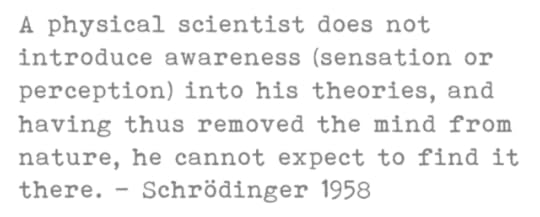
The post Schrödinger On Mind appeared on Andrew Furst.
Tiny Drops – Latitude
 Tiny Drops is an ongoing iPhoneographic series. The images represent moments of noticing on my part. For you, they are an offer to pause, observe, and take that noticing into your life. All photos are mine unless noted otherwise.
Tiny Drops is an ongoing iPhoneographic series. The images represent moments of noticing on my part. For you, they are an offer to pause, observe, and take that noticing into your life. All photos are mine unless noted otherwise. These works by Andrew Furst are licensed under a Creative Commons Attribution-NonCommercial-ShareAlike 4.0 International License.Latitude
These works by Andrew Furst are licensed under a Creative Commons Attribution-NonCommercial-ShareAlike 4.0 International License.Latitude
Click on images to view the full size slide show.
 MIT Doorknobs filter
MIT Doorknobs filter dragon
dragon bowling ball return 2 filterGet Each Week's Tiny Drops in your email box
bowling ball return 2 filterGet Each Week's Tiny Drops in your email boxFirst Name:
Last Name:
Email address:
Select a Weekly Series You'd Like to Follow:
One Minute Meditations
Tiny Drops (Photography series)
Compass Songs (My Favorite Poems)
Dialectic Two-Step
Modern Koans (interesting questions)
Sunday Morning Coming Down (Music Videos)
Relics (Timeless Republished Articles)
FIVE LIMITLESS THOUGHTS
May all living beings have happiness and its causes
May all be free from unhappiness and its causes
May all dwell in equanimity, free of attraction and aversion
May all quickly find the great happiness that lies beyond all misery
May all enjoy inner and outer peace now and forever
NAMO AMITOFOThe post Tiny Drops – Latitude appeared on Andrew Furst.



